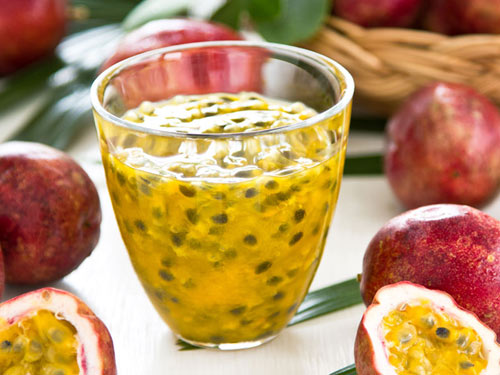The Many Health Benefits of Passion Fruit Consumption

Passion fruit was introduced in Hawaii in 1880 but was first cultivated commercially in Kenya in 1933. Three decades later, Ugandan farmers began to grow it on a large scale. Problems with plant disease and pest hindered the growth of the fruit in those countries, but when South Africa successfully produced 2,000 tons of it in 1947 and farmers in South America began to grow it commercially, production soared. Today, passion fruit is grown in tropical areas throughout the world, with millions of people enjoying its rich store of nutrients.
Fiber and Protein
Although some people prefer to strain passion fruit into juice, others enjoy the crunch of the seeds. Doing so provides extra nutritional benefits. A cup of passion fruit with the pulp and seeds intact contains 24.5 grams of fiber, the equivalent of more than 4 cups of bran cereal, and more than 5 grams of protein. Without the seeds and pulp, the fiber content drops to .5 grams per cup and the amount of protein drops below 1 gram.
Carotenoids
Each cup of passion fruit contains about 25 percent of your recommended daily value of vitamin A, which is crucial for maintaining good vision, healthy skin, cell growth and reproduction. Passion fruit contains at least 13 different carotenoids, including zeta-, beta- and alpha-carotene, b-cryptoxanthin and lycopene, all non-nutritive phytochemicals that help your body produce vitamin A. Carotenoids are fat soluble, so eating the seeds, which modestly increase a passion fruit's fat content, enables better absorption of the vitamin A.
Antioxidants
Passion fruit is rich in vitamin C, an antioxidant that protects you from the damage free radicals cause, preventing premature aging and keeping your immune system strong. With 71 milligrams per cup, one serving gives you all of the vitamin C you need each day. It also gives you 10 percent of the folate you need. Vitamin C and folate are water-soluble nutrients that slowly become depleted after harvest. A freshly-picked passion fruit is more nutritious than one that has been stored and transported, so get passion fruit from a farmers market when possible.
Iron
Passion fruit is a rich source of nonheme, or plant based, iron. While the Institute of Medicine recommends that men get 6 micrograms of iron per day and women get 8.1 micrograms, a cup of raw passion fruit provides nearly 4 milligrams. Paired with enriched cereals and iron-rich vegetables such as broccoli or beets, a vegetarian can get an adequate amount of iron by adding passion fruit to her diet. The vitamin C content of the passion fruit also helps your body absorb its iron content.





